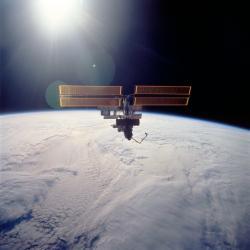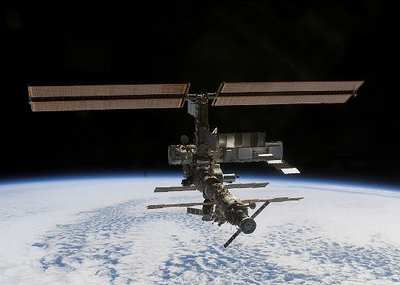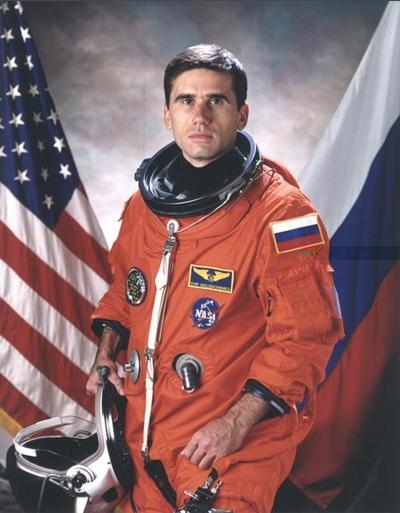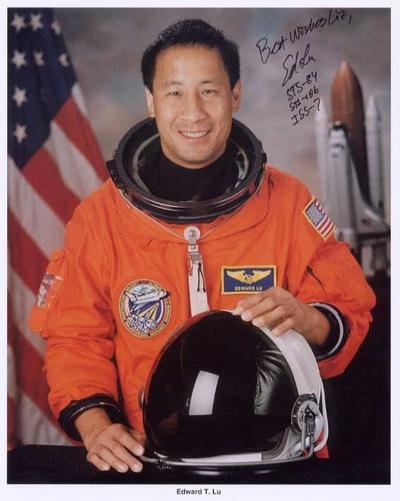Three's Company, Two's A Crowd
 For
the first time in the brief history of the International Space
Station, it will be manned by just two crewmembers in the upcoming
mission. They'll be on board together for six months, practically
living in each other's lap the entire time. A lot of marriages
can't survive that, much less two type-A astronauts - one from the
US and one from Russia.
For
the first time in the brief history of the International Space
Station, it will be manned by just two crewmembers in the upcoming
mission. They'll be on board together for six months, practically
living in each other's lap the entire time. A lot of marriages
can't survive that, much less two type-A astronauts - one from the
US and one from Russia.
Ed Lu and Yuri Malenchenko lift off from Kazakhstan Friday.
They'll spend several days with the two Americans and one Russian
they're replacing, then they'll be on their own.
Space officials in Russia, along with their NASA counterparts,
are said to be mildly concerned about the reduced ISS contingent.
"I think the dynamics of three people is a little bit easier in
that kind of situation rather than two," said Jim Voss, who lived
on the station for more than three months in 2001 and is now a
space station manager at Johnson Space Center. He was quoted by
Florida Today as saying, "Even with three people, you have to
really get along with your crewmates. You're there for a long time
in a small space."

Good Thing These Guys Get Along
Voss told the newspaper that, luckily, Lu and Malenchenko are
indeed good friends. They've flown together in the past and have
even walked in space together.
By putting two people on the ISS instead of three, Russian and
US officials say they'll be able to reduce the amount of supplies
needed during their six-month tenure. That's important in these
days when the US shuttle fleet is grounded in the wake of the
Columbia tragedy. Russia, strapped for cash, has promised to go to
the till for money to build more spacecraft, hoping to fill the
void left by the absence of the American shuttles.

But What Can A Two-Man Crew Accomplish?
Not a lot, actually. Shannon Lucid, NASA's chief scientist and a
six-month resident on the Russian Space Station Mir in 1996, told
Florida Today "They're basically there to take care of the
station," and they won't have much science to do. For that reason,
Russian space officials say, don't count on much science getting
done on this mission. The crew will spend most of its time keeping
the lights on and the air breathable. These guys are going to have
a lot of time on their hands.
The third astronaut scheduled for Mission 7 blamed the Columbia
disaster for being grounded. "It was a tragedy, what happened, and
we felt for that," said cosmonaut Alexander Kaleri, who was bumped
from the flight. "And for the station, it's a regret that (the
accident) caused us to change our development schedule. For the
majority amount of time (only two crew members are aboard), science
is in the background, and since that is what the station was
designed for, that is the most important source of regret."
"Being underworked - which is what I very often was - leads to
boredom," former NASA astronaut Norman Thagard, a Mir veteran and
the first American to fly on a Soyuz, told Florida Today. "And
being overworked chronically tends to lead to friction between the
crew and the Mission Control Center, and I think my two Russian
crewmates were overworked, and I sure could see the friction
develop. So they need to be in the comfortable middle range there.
They need to be reasonably busy with meaningful work."

Testing The Bonds That Tie US-Russia
While ISS Mission 7 will be a severe test of the friendship and
working relationship between Lu and Malenchenko, it's also a test
of the working relationship between the US and Russia. The two
countries are still at odds over the Iraq war. But that tension is
reportedly nowhere to be seen in the joint ISS project. "We're
really pulling together as a team," space station program manager
Bill Gerstenmaier told Florida Today reporter Chris Kridler at the
Baikonur Cosmodrome in Star City, Kazakhstan. "We're recognizing
where we need critical consumables, where we need critical
activities."
"The engineers and all the smart people have done their
analysis, and the decision has been made that it's much better for
the space station if we keep it continually crewed," Lucid said. ".
. . I think the crew is going to have a really good time. It's
going to be a real adventure."
 Bolen Gives Congress a Rare Thumbs-Up
Bolen Gives Congress a Rare Thumbs-Up The SportPlane Resource Guide RETURNS!!!!
The SportPlane Resource Guide RETURNS!!!! Buying Sprees Continue: Textron eAviation Takes On Amazilia Aerospace
Buying Sprees Continue: Textron eAviation Takes On Amazilia Aerospace Hawker 4000 Bizjets Gain Nav System, Data Link STC
Hawker 4000 Bizjets Gain Nav System, Data Link STC Echodyne Gets BVLOS Waiver for AiRanger Aircraft
Echodyne Gets BVLOS Waiver for AiRanger Aircraft






